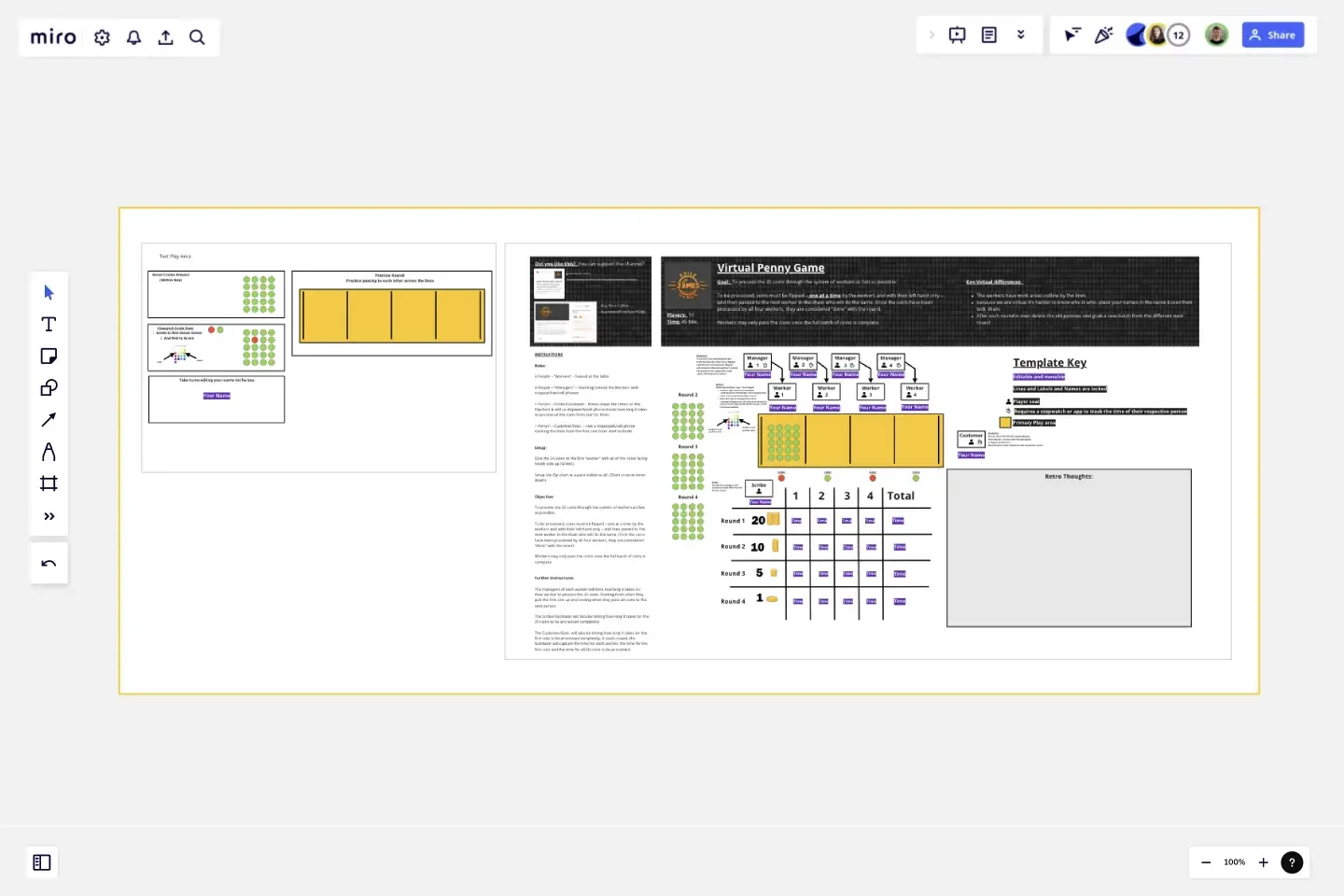Penny Game
The Penny Game is a popular agile game to teach the importance of reducing batch sizing and the evils of large workloads.
About the template
The Penny Game is a popular agile game to teach the importance of reducing batch sizing and the evils of large workloads. It helps people understand the time it takes to deliver value to a customer.
How to use this template
This game is ideally for 10 people plus the facilitator but can be scaled back to 4 people with the facilitator taking over the roles of the customer and the scribe. Each worker would then use their cell phone to start timing the start/stop time of themselves, while the facilitator tracks time from the first coin flipped/changed colour by the first worker... to the last penny flipped by the last worker.
This template was created by Agile Games With James.
Get started with this template right now.
Sailboat Retro
Works best for:
Retrospectives, Agile Methodology, Meetings
The Sailboat Retrospective template offers a metaphorical journey through past iterations and future goals, likening the retrospective process to sailing a boat. It provides elements for identifying driving forces (winds), restraining forces (anchors), and destination (goal). This template enables teams to reflect on what propels them forward, what holds them back, and where they want to go next. By promoting visualization and metaphorical thinking, the Sailboat Retrospective empowers teams to navigate challenges, set sail towards their objectives, and steer towards success effectively.
Scrum Puzzle Iteration Game
Works best for:
Agile, Games, Icebreaker
The Scrum Puzzle Iteration Game is a hands-on activity that reinforces Scrum principles and practices. By simulating iterative development cycles through puzzle-solving, teams learn the importance of collaboration, adaptability, and continuous improvement. This template provides a fun and engaging way to internalize Scrum concepts and enhance teamwork, empowering Agile practitioners to deliver value more effectively.
20/80 Process Diagram - EOS Compatible
Works best for:
Diagramming
The 20/80 Process Diagram - EOS® Compatible template is a visual tool for mapping out processes and workflows aligned with the Entrepreneurial Operating System (EOS®) methodology. It provides a structured framework for identifying core processes and key activities that drive business outcomes. This template enables organizations to streamline operations, clarify roles and responsibilities, and enhance accountability. By promoting alignment with EOS® principles, the 20/80 Process Diagram empowers teams to achieve organizational excellence and drive sustainable growth.
Lean Coffee: Meetings without Agendas
Works best for:
Agile
Lean Coffee: Meetings without Agendas is a collaborative meeting format that fosters open dialogue and emergent topics. Participants suggest discussion topics, vote on them, and engage in time-boxed conversations. This template provides a structured framework for facilitating Lean Coffee sessions, enabling teams to prioritize topics, share insights, and make decisions collectively. By promoting inclusivity and adaptability, Lean Coffee empowers teams to address issues efficiently and drive continuous improvement.
Learning Loop Retro Template
Works best for:
Retros, Agile
The Learning Loop Retro template is a powerful tool designed to help teams reflect on their projects by recognizing successes and identifying areas for improvement. This template is part of Miro's Intelligent templates, which streamline workflows and keep teams engaged by integrating AI, interactive tools, and seamless integrations. One key benefit of the Learning Loop Retro template is its ability to drive continuous improvement. By regularly reflecting on their work and identifying areas for enhancement, teams can consistently elevate their performance and achieve better outcomes.
Retrospective in the Island of Golocans
Works best for:
Retrospectives, Meetings, Agile Methodology
The Retrospective in the Island of Golocans template offers a creative and imaginative setting for retrospectives, transporting participants to a fictional island setting. It provides elements for reflecting on past iterations, sharing insights, and brainstorming improvements. This template enables teams to step outside their usual environment and approach retrospectives with a fresh perspective. By promoting creativity and storytelling, the Retrospective in the Island of Golocans empowers teams to engage in meaningful discussions, generate new ideas, and foster a culture of innovation effectively.
